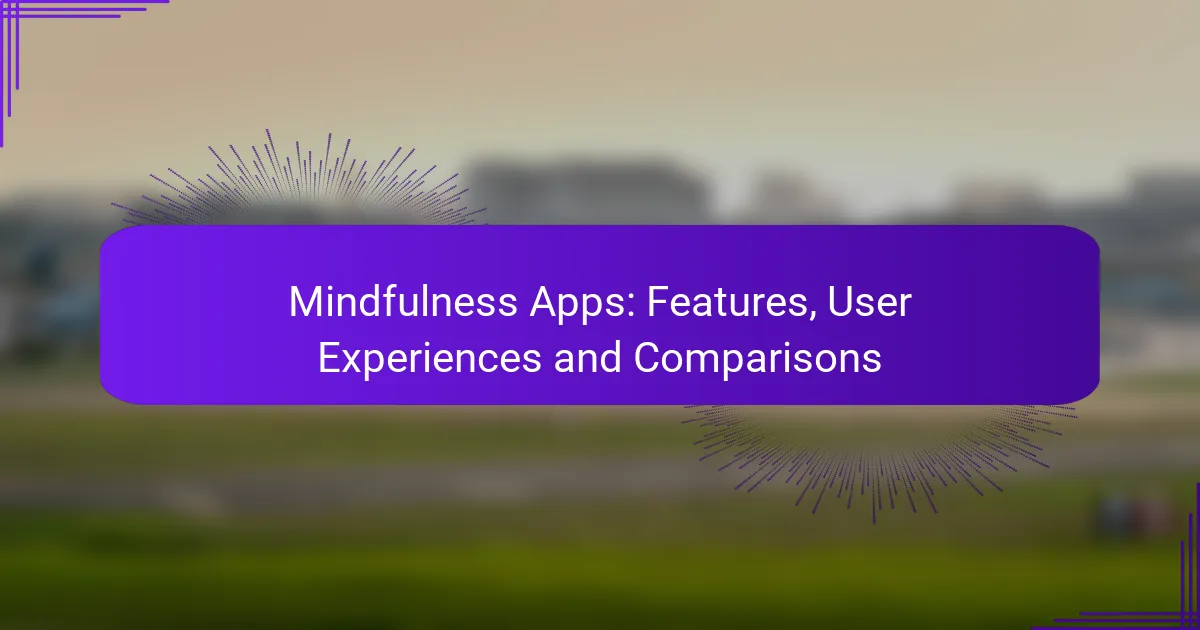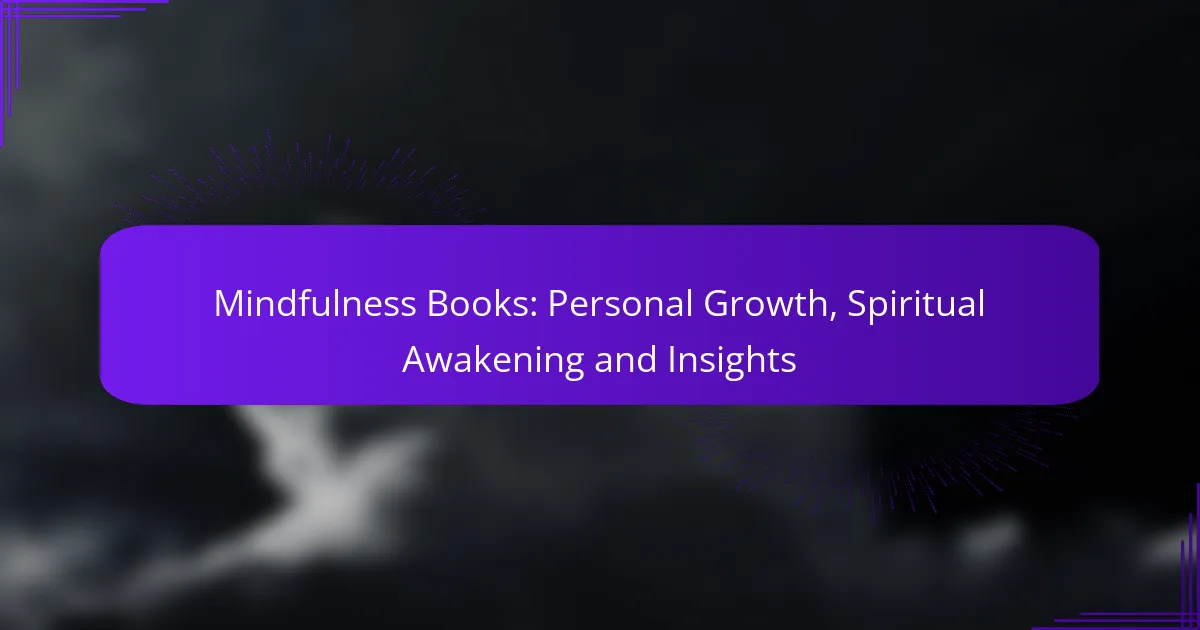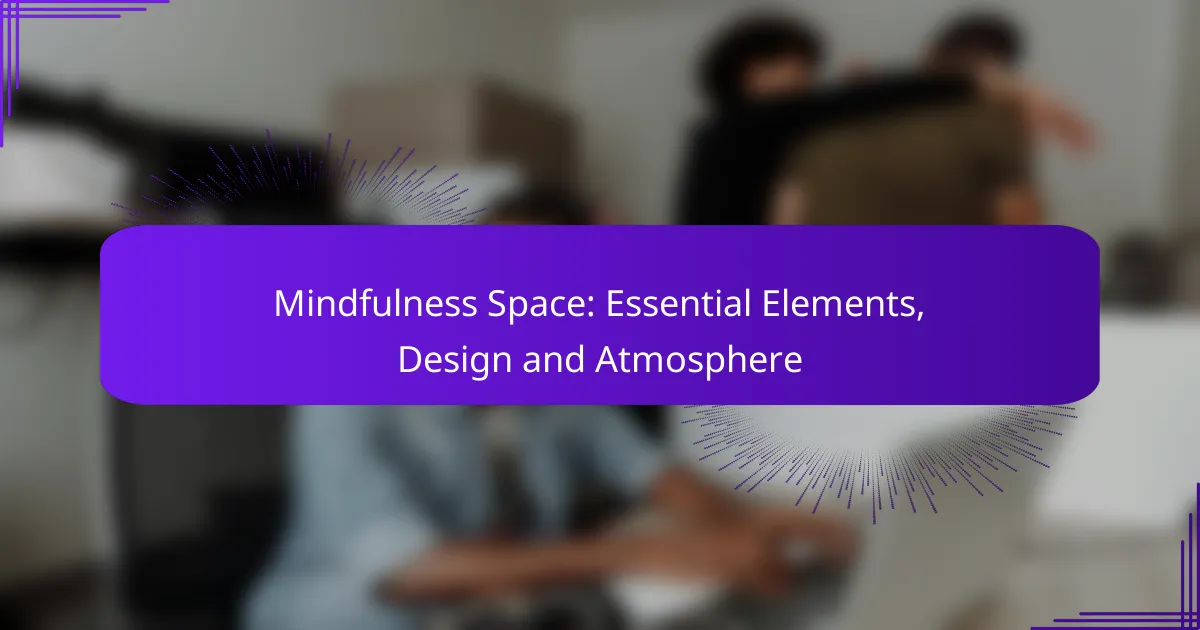Mindfulness apps have become essential tools for individuals seeking to enhance their mental well-being through meditation and mindfulness practices. With a range of features such as guided sessions, progress tracking, and customizable options, these apps cater to various user preferences and experience levels. Popular options like Headspace, Calm, and Insight Timer offer unique benefits, making it important for users to evaluate their needs and budget when selecting the right app for their mindfulness journey.
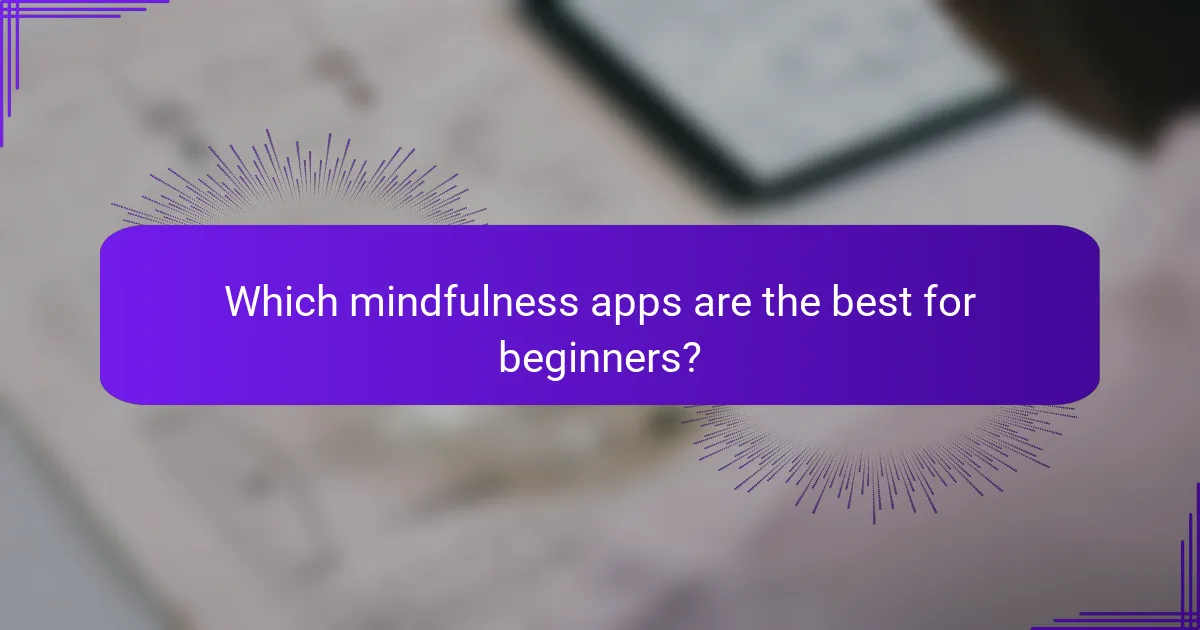
Which mindfulness apps are the best for beginners?
For beginners, the best mindfulness apps are those that offer user-friendly interfaces, guided sessions, and a variety of features to ease into practice. Popular choices include Headspace, Calm, and Insight Timer, each catering to different preferences and needs.
Headspace features
Headspace is designed with simplicity in mind, offering a clean interface and a range of guided meditations. Key features include themed courses, sleep sounds, and mindfulness exercises that cater to various skill levels. Beginners can benefit from the “Basics” course, which introduces fundamental concepts in short, digestible sessions.
Additionally, Headspace provides progress tracking, allowing users to monitor their meditation habits over time. This feature can motivate beginners to establish a consistent practice, which is crucial for developing mindfulness skills.
Calm user experience
Calm focuses on creating a serene user experience with soothing visuals and sounds. Its library includes guided meditations, sleep stories, and calming music, making it appealing for those who struggle with anxiety or sleep issues. The app’s user-friendly design helps beginners navigate easily through its offerings.
One standout feature is the “Daily Calm,” a new meditation released each day, encouraging users to return regularly. This daily engagement can help beginners build a routine and deepen their mindfulness practice over time.
Insight Timer community
Insight Timer distinguishes itself with a strong community aspect, offering a vast library of free guided meditations from various teachers worldwide. Beginners can explore different styles and techniques, allowing them to find what resonates best with their personal preferences.
The app also features community groups and discussion forums, fostering connections among users. This social aspect can enhance motivation and provide support for those new to mindfulness, making it easier to stay committed to their practice.
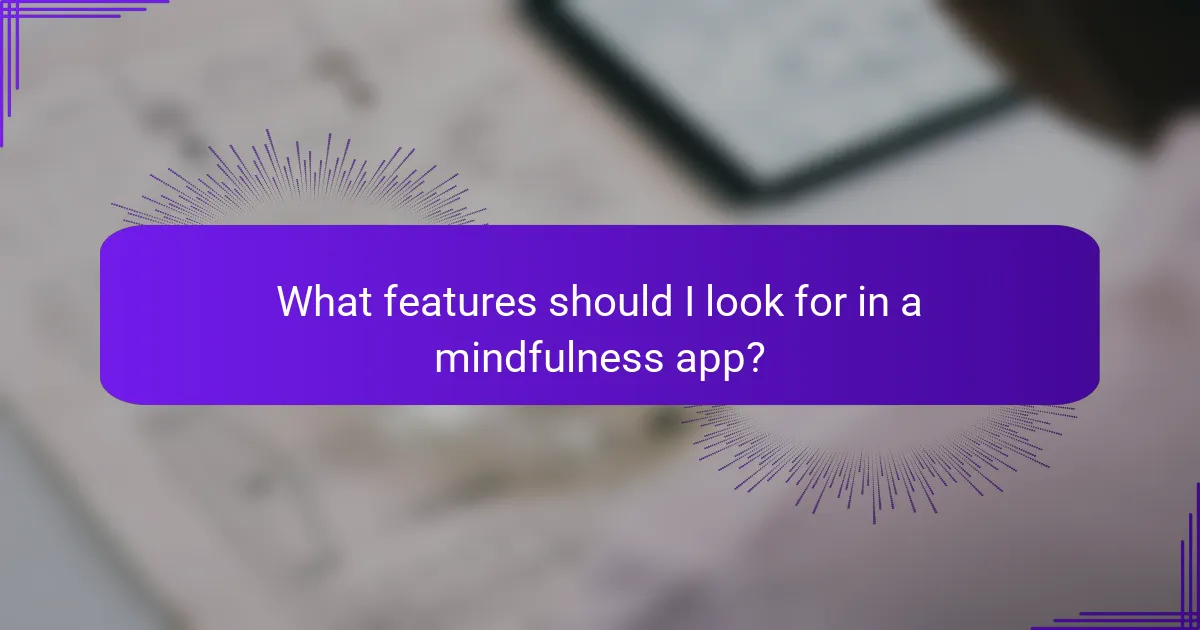
What features should I look for in a mindfulness app?
When choosing a mindfulness app, consider features that enhance your meditation experience and support your personal growth. Key elements include guided meditations, progress tracking, and customization options, which can help you stay engaged and motivated.
Guided meditations
Guided meditations are essential for beginners and those seeking structure in their practice. Look for apps that offer a variety of sessions, ranging from a few minutes to over an hour, covering different themes such as stress relief, sleep, and focus. Popular options often include voice guidance from experienced instructors, which can enhance your meditation experience.
Consider the diversity of meditation styles available, such as mindfulness, loving-kindness, or body scan. This variety allows you to explore different techniques and find what resonates with you, making your practice more enjoyable and effective.
Progress tracking
Progress tracking features help you monitor your meditation habits and stay motivated. Many apps provide visual representations of your practice, such as streaks, total minutes meditated, or completed sessions. This data can encourage consistency and help you set achievable goals.
Look for apps that allow you to set reminders or notifications, which can assist in establishing a regular practice. Some apps even offer community features, enabling you to share your progress with friends or join group challenges for added motivation.
Customization options
Customization options allow you to tailor your mindfulness experience to your preferences. Choose an app that lets you select meditation lengths, background sounds, and instructor voices to create a personalized atmosphere. This flexibility can make your practice more enjoyable and effective.
Additionally, consider apps that offer personalized recommendations based on your meditation history and preferences. This feature can help you discover new content that aligns with your goals and keeps your practice fresh and engaging.
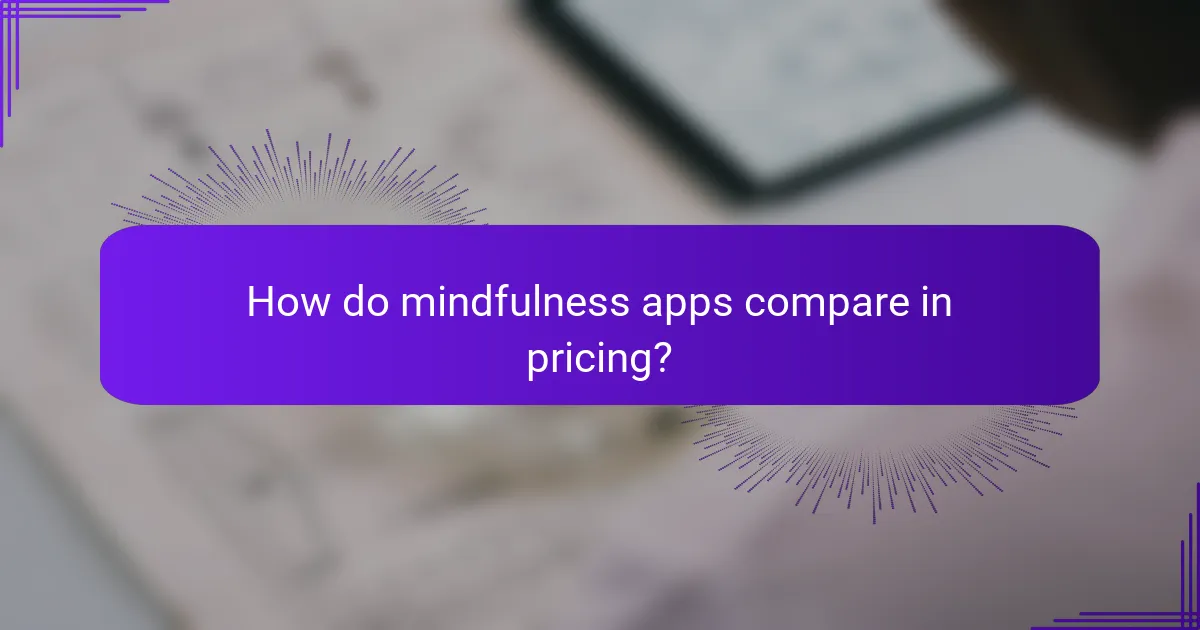
How do mindfulness apps compare in pricing?
Mindfulness apps vary significantly in pricing, with options ranging from free features to premium subscriptions. Users should consider their budget and the specific features they value when choosing an app.
Headspace subscription costs
Headspace offers a subscription model that typically costs around $12.99 per month, with discounts for annual plans. An annual subscription can reduce the monthly cost to approximately $7.99, making it a more economical choice for long-term users.
Headspace frequently provides free trials, allowing potential users to explore the app’s features before committing financially. This can be a great way to assess whether the content aligns with personal mindfulness goals.
Calm membership plans
Calm features a similar pricing structure, with monthly access priced at about $14.99. Users can save by opting for an annual subscription, which usually costs around $69.99, translating to roughly $5.83 per month.
Calm often promotes special offers or discounts, especially during holidays, making it worthwhile to check for deals before subscribing. The app also includes a variety of content types, such as sleep stories and guided meditations, which can justify the cost for many users.
Insight Timer free features
Insight Timer stands out by offering a robust selection of free features, including thousands of guided meditations and talks from various teachers. Users can access most of the app’s content without a subscription, making it an attractive option for those on a tight budget.
While Insight Timer does offer a premium subscription for additional features, such as offline listening and advanced courses, many users find the free version sufficient for their mindfulness practice. This accessibility allows users to explore mindfulness without financial commitment.
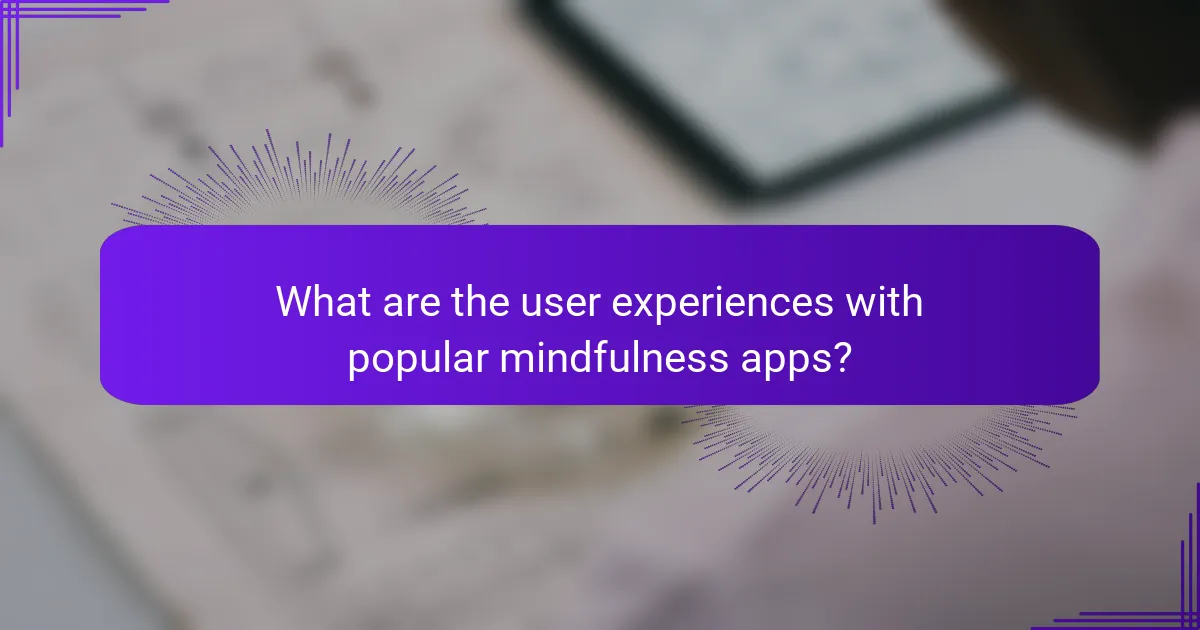
What are the user experiences with popular mindfulness apps?
User experiences with popular mindfulness apps vary widely, reflecting individual preferences and needs. Many users report increased relaxation and reduced anxiety, while others appreciate the structured guidance these apps provide for meditation and mindfulness practices.
Headspace user reviews
Headspace users often highlight its user-friendly interface and engaging animations that make meditation enjoyable. Many appreciate the variety of guided sessions, which range from a few minutes to over an hour, catering to both beginners and experienced practitioners.
However, some users mention that the subscription cost can be a drawback, especially for those seeking free options. Overall, Headspace is praised for its effectiveness in helping users develop a consistent mindfulness practice.
Calm app testimonials
Calm users frequently commend its extensive library of sleep stories, music, and meditation sessions. The app’s focus on sleep improvement is particularly appreciated, with many users reporting better sleep quality after incorporating its features into their nightly routines.
On the downside, some users find the app’s navigation slightly overwhelming due to the sheer volume of content. Despite this, Calm remains a popular choice for those looking to enhance their mindfulness and relaxation experiences.
Insight Timer feedback
Insight Timer is often lauded for its vast selection of free meditations and community-driven features. Users appreciate the ability to connect with others and share experiences, which enhances their mindfulness journey.
While the app offers a wealth of content, some users note that the quality can vary, as many sessions are created by independent teachers. Nonetheless, Insight Timer is favored for those seeking a diverse range of practices without the financial commitment of a subscription.
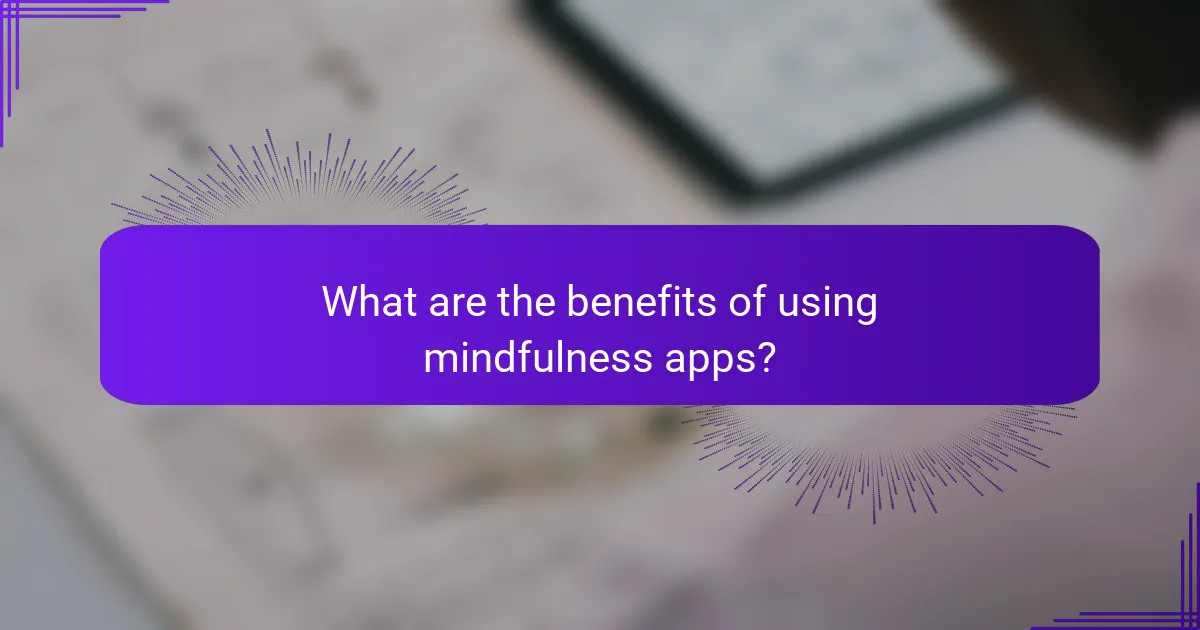
What are the benefits of using mindfulness apps?
Mindfulness apps offer various benefits, including stress reduction, improved focus, and enhanced emotional well-being. These digital tools provide guided practices and resources that help users cultivate mindfulness in their daily lives.
Stress reduction
Mindfulness apps are effective for stress reduction by teaching users techniques such as meditation and deep breathing. Regular practice can lower cortisol levels, leading to a calmer state of mind. Many apps include features like guided sessions specifically designed to address stress, often ranging from a few minutes to over an hour.
To maximize stress relief, users should aim for consistency, practicing mindfulness daily or several times a week. Setting reminders within the app can help establish this routine and ensure regular engagement.
Improved focus
Using mindfulness apps can significantly enhance focus by training the mind to concentrate on the present moment. Techniques such as focused attention meditation help users develop better concentration skills, which can be beneficial in both personal and professional settings. Sessions typically last between 5 to 20 minutes, making them easy to incorporate into a busy schedule.
To improve focus, users should choose sessions that specifically target attention and concentration. Avoid multitasking during these practices to fully benefit from the exercises and notice improvements in daily tasks.
Enhanced emotional well-being
Mindfulness apps contribute to enhanced emotional well-being by promoting self-awareness and emotional regulation. Users learn to recognize their thoughts and feelings without judgment, which can lead to better coping strategies during challenging times. Many apps offer mood tracking features that help users identify patterns and triggers over time.
For optimal emotional benefits, users should engage with the app regularly and explore various techniques, such as gratitude practices or loving-kindness meditation. This variety can deepen the mindfulness experience and foster a more positive outlook on life.
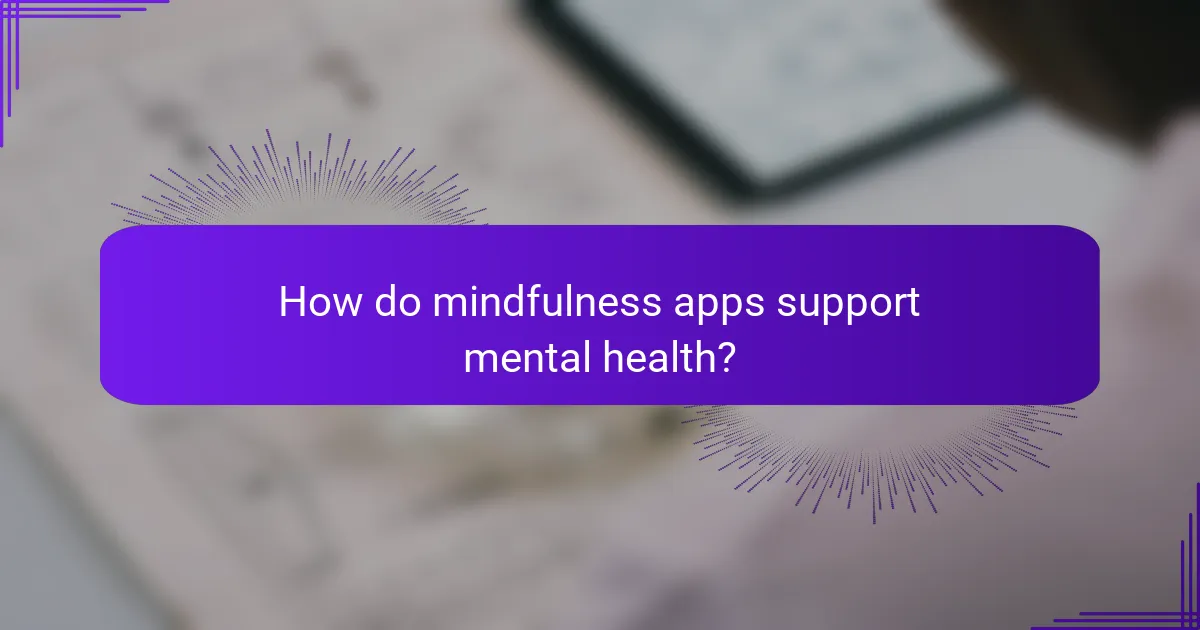
How do mindfulness apps support mental health?
Mindfulness apps support mental health by providing accessible tools and resources that promote relaxation, stress reduction, and emotional well-being. These applications offer structured programs and practices that can help users develop mindfulness skills and integrate them into daily life.
Therapeutic features
Many mindfulness apps include therapeutic features such as guided meditations, breathing exercises, and sleep aids. These tools are designed to help users manage anxiety, improve focus, and enhance overall mental resilience. For instance, some apps offer customizable meditation lengths, allowing users to choose sessions ranging from a few minutes to over an hour.
Additionally, features like mood tracking and journaling can help users identify patterns in their mental health, making it easier to address specific issues. Look for apps that provide progress tracking to visualize improvements over time.
Community support
Community support within mindfulness apps can enhance the user experience by fostering a sense of belonging and accountability. Many platforms offer forums or social features where users can share experiences, challenges, and successes. This interaction can motivate users to stick with their mindfulness practices.
Some apps also host group challenges or live sessions, encouraging users to engage with others on similar journeys. Participating in these community-driven activities can provide additional encouragement and support.
Expert-led sessions
Expert-led sessions are a key feature in many mindfulness apps, offering users access to trained professionals who guide practices. These sessions can range from short daily meditations to in-depth workshops on specific topics like stress management or emotional healing.
When selecting an app, consider those that feature well-known mindfulness experts or psychologists. This can enhance the credibility of the content and ensure that users receive high-quality guidance tailored to their needs.
